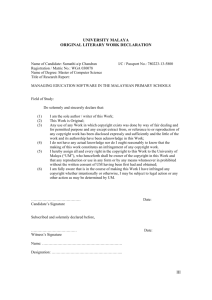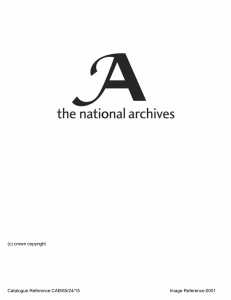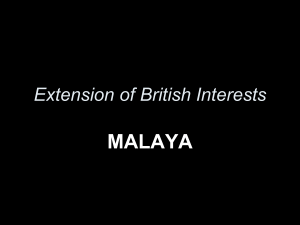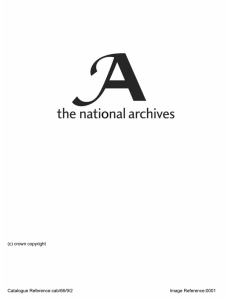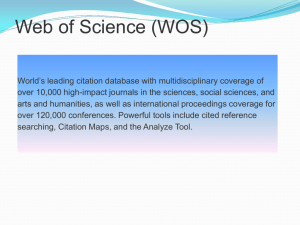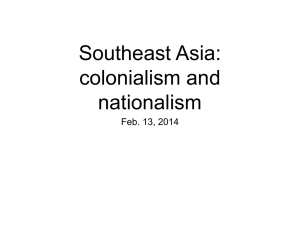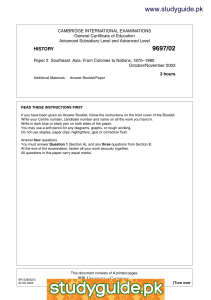Printed for the Cabinet. July 1st July,
advertisement
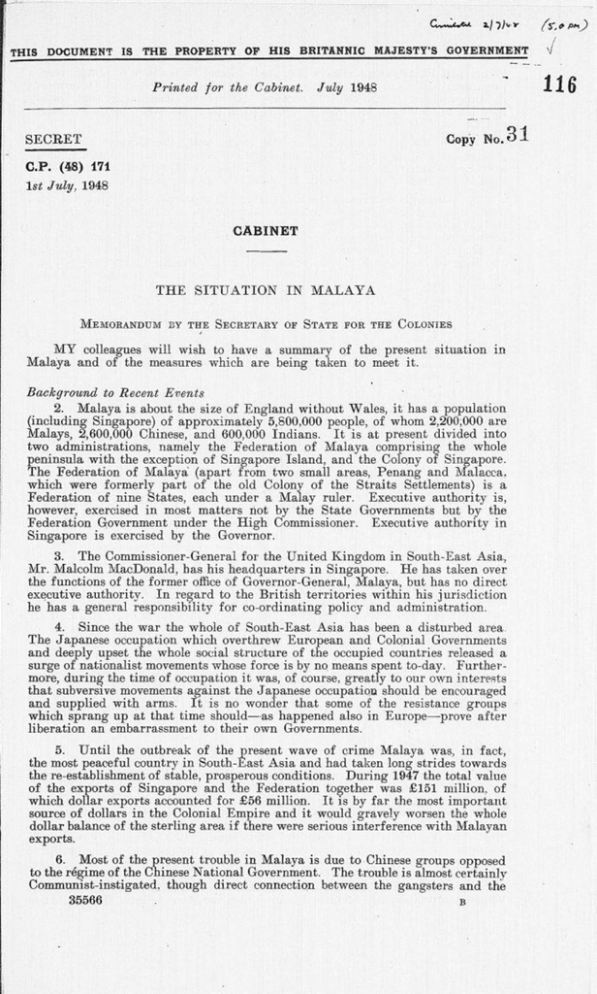
THIS DOCUMENT IS THE PROPERTY Printed OP H I S for the Cabinet. BRITANNIC July MAJESTY'S GOVERNMENT 1948 SECRET Copy No. 3 1 C P . (48) 171 1st July, 1948 CABINET T H E S I T U A T I O N IN M A L A Y A MEMORANDUM BY THE SECRETARY OF STATE FOR THE COLONIES MY colleagues will wish to have a summary of the present situation in Malaya and of the measures which are being taken to meet it. Background to Recent Events 2. Malaya is about the size of England without Wales, it has a population (including Singapore) of approximately 5,800,000 people, of whom 2,200,000 are Malays, 2,600,000 Chinese, and 600,000 Indians. I t is at present divided into two administrations, namely the Federation of Malaya comprising the whole peninsula with the exception of Singapore Island, and the Colony of Singapore. The Federation of Malaya (apart from two small areas, Penang and Malacca, which were formerly p a r t of the old Colony of the Straits Settlements) is a Federation of nine States, each under a Malay ruler. Executive authority is, however, exercised in most matters not by the State Governments but by the Federation Government under the High Commissioner. Executive authority in Singapore is exercised by the Governor. 3. The Commissioner-General for the United Kingdom in South-East Asia, Mr. Malcolm MacDonald, has his headquarters in Singapore. He has taken over the functions of the former office of Governor-General, Malaya, but has no direct executive authority. I n regard to the British territories within his jurisdiction he has a general responsibility for co-ordinating policy and administration. 4. Since the war the whole of South-East Asia has been a disturbed area. The Japanese occupation which overthrew European and Colonial Governments and deeply upset the whole social structure of the occupied countries released a surge of nationalist movements whose force is by no means spent to-day. Further­ more, during the time of occupation it was, of course, greatly to our own interests that subversive movements against the Japanese occupation should be encouraged and supplied with arms. I t is no wonder that some of the resistance groups which sprang up at that time should—as happened also in Europe—prove after liberation an embarrassment to their own Governments. 5. Until the outbreak of the present wave of crime Malaya was, in fact, the most peaceful country in South-East Asia and had taken long strides towards the re-establishment of stable, prosperous conditions. During 1947 the total value of the exports of Singapore and the Federation together was £151 million, of which dollar exports accounted for £56 million. I t is by far the most important source of dollars in the Colonial Empire and it would gravely worsen the whole dollar balance of the sterling area if there were serious interference with Malayan exports. 6. Most of the present trouble in Malaya is due to Chinese groups opposed to the regime of the Chinese National Government. The trouble is almost certainly Communist-instigated, though direct connection between the gangsters and the 35566 B Communist P a r t y cannot always be traced. Secret Societies have always been a prominent feature of Chinese life and were a thorn in the flesh of Government in Malaya right through the 19th century. A t various times during that century they led to outbreaks of armed violence, principally between opposing factions of Chinese. 7. On the reoecupation after the recent war, the Chinese Communist guerillas (the Malayan Peoples" Anti-Japanese Army) were in control of large areas, particularly in Johore and Perak. Their excesses were the cause of bloody Sino-Malay clashes in the month following the reoccupation. 8. Although the present trouble is largely instigated by the Chinese, a word must be said about the other two main communities in Malaya, the Malays and the Indians. The Malays have been largely preoccupied with the constitutional negotiations which led to the modification of the Malayan Union proposals and the shaping of the present constitution. The Malays are satisfied with this and have so far been very little concerned in the present disturbances. There are nevertheless a number of Malays in the Malayan Communist P a r t y and there are Malay organisations thoroughly permeated with Communist influences. The Indians now provide many of the overt leaders of the Communist P a r t y and its satellite organisations, because, being British subjects, they have not been treated since the reoccupation as liable to deportation under the law in force in the Malay States. The Indian leaders are, however, suspected to be mainly men of straw, and the real organisers are Chinese who have gone underground. Indian community is largely employed as estate labour, and is traditionally passive and unaggressive, but easy prey for agitators. 9. I t is also necessary to mention the position of the trade unions in Malaya. The trade unions are still young and poorly organised owing to the fact that the majority of workers are unsophisticated and illiterate. Encouragement has been given to the growth of trade unions but unfortunately a large number of the existing unions have been infiltrated by what may be called professional '' organisers,'' whose main object is to turn the trade unions into a profitable source of income and political advantage for themselves. As in some other countries, these " organisers " are influenced and often controlled by the Com­ munist Party. The evils have not stopped short at mere unscrupulous use of union organisation for ends other than the workers' advantage. There has been physical intimidation of workers on a large scale. Indian estate labour in some areas has been organised into disciplined bands, sometimes uniformed, armed with lathis and knives. I n Singapore an illegal strong arm force (the " Workers' Protection Corps ") has been organised by the Singapore Federation of Trade Unions (a Communist-doniinated body) for purposes of intimidation and extortion. 10. We have had several experienced British trade union officials working to guide and help the trade unions and my Labour Adviser has also examined and discussed problems on the spot and suitable action taken. I n addition, early this year at the request of the local authorities in Malaya I arranged for Mr. S. Awbery, M.P., of the Transport and General Workers' Union, and Mr. F . W. Dalley, of the Eailway Clerks' Union, to visit Singapore and Malaya to report on the state of trade unionism. I have just received their report (which has not yet been published). I t draws attention to the difficulties of developing healthy trade unionism where the workers have still a low standard of education and have been exploited by unscrupulous so-called organisers; and makes recommendations which I shall follow up. Present Situation 11. I n the last few weeks violent crimes have again broken out in the Federation, and labour unrest has become more marked. On 1st June a strong force of police had to be used to clear 200 Chinese labourers from an estate in Johore where they had taken control. After a police charge seven Chinese were found dead. On 4th J u n e the High Commissioner reported that in recent weeks there had been twelve serious attacks, all save one attributable to organised politically-inspired violence. I n the week ending 12th June there were five murders and two attempted murders, all, save one attempted murder, political in origin. On 16th J u n e three European planters in Perak were attacked and murdered in their bungalows by a gang of Chinese armed with Sten guns, while elsewhere in Perak and on an estate in Johore, where strikes had just ended, a Chinese foreman and a Chinese labour contractor were killed. On 17th June twelve armed Chinese raided the police station at a small village twelve miles from Johore Bahru, and made off with a police rifle, after wounding a passer-by. From the 18th to 29th June inclusive, fifteen murders and fifteen attempted murders have been reported to me. I t is noteworthy that a number of these attacks conform to a pattern. They are directed against:— (a) The managerial staff, European and Asian, of outlying estates. (b) Leaders of local Kuo Min Tang parties. (c) Persons who have given evidence in intimidation cases. The attacks are carried out by bands of well-armed Chinese, either as ambushes or by sudden descents (sometimes by bicycle) on isolated buildings. There have been no large-scale disturbances by labour, and the strike situation which was at no time really serious is now very good : there are now only eight small strikes in progress involving less than 900 workers in all. 12. I n Singapore there was a wave of unrest among waterfront labour and among workers in rubber milling factories during April. There were a few incidents, but Government remained in control of the situation, and attempts at one-day general strikes were failures. Since 5th June no cases of violence or intimidation of a political nature have been reported from Singapore. Agitators have continued to make inflammatory speeches, and it is reported that in spite of arrests of ringleaders the " Workers' Protection Corps'" is being expanded. 13. Although there is less violence in Singapore, the basic situation in both the Federation and the Colony is the same. There is no concrete evidence that the Malayan Communist P a r t y is directly responsible for the present lawlessness but extreme political factions and certain trade unions have been infiltrated by communism. The same methods of attack are used—intimidation and the wrecking of normal industrial conciliation machinery. Asian born Chinese, who until recently were active in organisations associated with lawlessness.- now seem to use Indian or British nationality for their purpose. 14. The Commissioner-General has represented that the first objective of the Communist gangs has been and is still by terrorist campaign to produce the maximum industrial unrest and disruption of economic life of the country, with a view amongst other things to destroying the Governmenfs authority. Evidence is that the tactics of the Communist gangs are changing from fomenting labour disputes to a policy of picking off the managerial staff of installations and mines. Cash is also being obtained by hold-ups on pay day, particularly in isolated areas. I t may be reasonably expected that attempts will be made to sabotage communica­ tions, industrial plants and factories, power stations and other vital points. In addition to terrorist acts by individuals or small gangs there are many persons who do not engage in violence themselves but who foster and direct these activities by various methods. Such persons are distributed throughout the Federation and Singapore, and most are overt or covert members of the Malayan Communist P a r t y and kindred organisations. Further, there is information that mobilisation and training of bands of guerillas in jungle hide-outs is now coming into force and they will be well organised and armed and their activities will include attacks on villages and small towns to commit murders and robberies and to dislocate transport systems with ultimate objective of controlling certain areas. As police and military operations succeed in restoring law and order in the more settled areas, such malefactors who escape will tend to join the guerilla bands in the jungle. Guerilla bands may attack Malay kempongs (or homesteads of scattered buildings) in particular, partly in order to obtain food, &c, for their maintenance, but also as part of a preconceived plan to stir up gradual Malay enmity such as occurred during the Japanese occupation and immediately after. This may result in outbursts of violence by Malays against innocent Chinese and adds to the general state of unrest. Measures to Meet the Situation 15. I n this situation of violence and murderous outrages in various States, with labour troubles and lawlessness, the following steps have become necessary :— (i) Temporary amendment of trade union legislation to limit trade union officers to persons associated with the trade or industry concerned and to confine federations of trade unions to bona fide industrial organisa­ tions in the particular trades or callings. 35566 B 2 (ii) A state of emergency was proclaimed on 16th. J u n e in certain areas of Perak and Johore, and extended on 17th June to the whole of the State of Perak and on 18th June to. the remainder of the Federation. Emergency Regulations have been made which include the reimposition of the death penalty for the offence of carrying arms, and the authori­ ties have been empowered to detain any person without trial, to search persons and buildings without warrant and to occupy properties. Where local conditions require, the authorities have power to impose a curfew and to control the movement of persons and vehicles. (iii) The use of the powers of deportation conferred by existing legislation in Malaya was, prior to the present disturbances, confined by my direction to aliens. In response to strong representations from the authorities in Malaya that British subjects (mainly Indians) were in -consequence being used as stooges by organisers of seditious movements I have agreed to deportation powers being exercised throughout the Federation against any person who is not identified with the country as a Federal citizen. (iv) The emergency legislation referred to. at (ii) above will, upon the declaration of a stage of emergency, enable the High Commissioner to make regulations providing inter alia for the detention of any person for a period not in excess of two years. I have given directions that these powers of detention are only to be exercised against persons who are implicated in acts of violence or in organising or inciting persons to take part in strikes, disturbances or demonstrations in which violence or threat of violence is used. I have also given directions that papers relating to each case in which detention is recommended must be reviewed by a Supreme Court Judge. The above powers of detention will enable action to be taken against Federal citizens who will, as indicated in (iii) above, not be regarded as liable to deportation, (v) Very active measures are being taken to strengthen the police in both the Federation and Singapore. These measures include the organisa­ tion of a force of special constabulary; the increase of the regular police force by further recruitment and training of local personnel; the formation of a frontier force or gendarmerie to patrol the northern frontier where undesirable persons and arms can enter Malaya; the diversion of civil officers from ordinary duties to assist in the adminis­ trative work of the police, and in organising and directing the special constabulary; special measures to expedite the supply of equipment on existing orders, and to obtain new equipment, such as scout cars, armoured cars, mobile wireless sets, and additional supplies of arms and ammunition. (vi) I n addition to the other measures for strengthening the police force, I have sent out to Malaya Mr. W. N. Gray, late Inspector-General of the Palestine Police, who has special experience in combating terrorism. His mission will be to discuss all measures likely to increase the efficiency of existing police action against terrorism, including the possibility of strengthening the police with recruits from the Palestine Police. I am expecting to get, within the next few days, estimates from Malaya of the number of men from the Palestine Police who could usefully be employed. I n any case I have been asked to recruit 60 additional assistant superintendents of police. (vii) The Army and R.A.F. are giving the fullest support to the Police and close co-operation between the military and the civil authorities is provided by the British Defence Co-ordination Committee, F a r East, over which the Commissioner-General presides, and the local Defence Committees in Singapore and the Federation of Malaya, (viii) In the last few days the Commissioner-General, Mr. Malcolm MacDonald, has represented to me that the High Commissioner for the Federation of Malaya, Sir Edward Gent, has lost the confidence of the public in the Federation and the heads of other Services. He reported that in consequence it was essential, in his view, to recall Sir Edward Gent to England at once, and that he should not return to Malaya. His recommendation was made in such terms that I had no alternative but to agree to it at once, and Sir Edward Gent is now flying home. Tie is due in England on 3rd July. The Chief Secretary of the Federation of Malaya, Sir Alexander Newboult, is now acting as High Commissioner pending another appointment. Plan of Future Operations 16. The Commissioner-General has sent me the following summary of the operations proposed as a result of inter-Service discussions in Malaya. Opera­ tions are planned in two phases :— 17. I n phase 1 the objective is to restore law and order in settled areas of the territory and to maintain the economic life of the country and restore morale. This will be carried out through two distinct types of operations : (a) by offensive operations to round up gangsters, including the establishment of road blocks and traffic control, periodical sweeps where murders or robberies have been committed, and widespread searches for arms and other incriminating evidence; (&) protective measures, through provision of armed guards for police stations, power stations, prisons, warehouses, factories, docks and other vital points. I n order to main­ tain the economic life of the country and restore confidence in outlying districts it is also necessary to provide static guards for the larger rubber estates, mines, transport system and Malay villages. 18. Phase 2 will comprise the operations necessary to liquidate the guerilla bands whose headquarters are in the jungle. This will involve the destruction of their camps, cutting off of food supplies, and uncovering dumps of arms and equipment. These operations will be primarily of a military nature in which, however, the police will participate. The operations may take a considerable time owing to the nature of the country involved. Phase 2 cannot be extensively undertaken until sufficient success has been achieved in phase 1. 19. The Civil and Service authorities in Malaya are, of course, in consulta­ tion as to whether the existing military forces in Malaya are adequate to meet all foreseeable calls upon them arising from the present disturbances. A. C. J . Colonial Office, 1st July, 1948.
